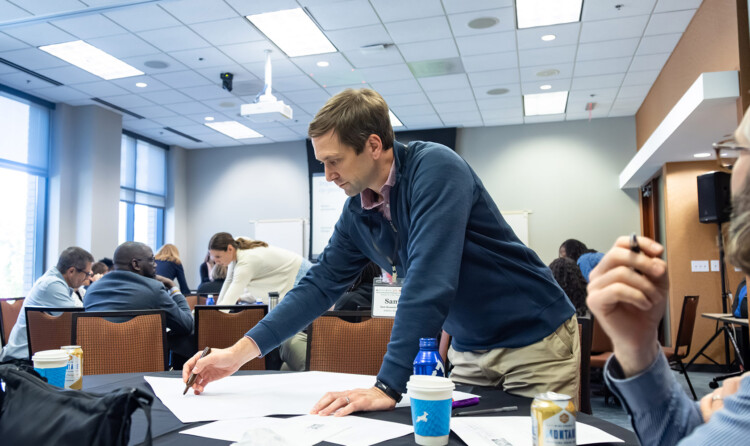We are proud to announce six new research grants, totaling over $2.8 million, in support of four studies on ways to reduce inequality in youth outcomes and two studies on strategies for improving the use of research evidence in ways that benefit young people. Approved at the most recent meeting of the Foundation’s Trustees, these grants will help build theory and empirical evidence in our two focus areas.
Among the grants focused on reducing inequality include studies investigating whether state policies requiring students to take advanced high school courses reduce racial and gender inequalities in advanced course-taking; whether permanently expanding the Earned Income Tax Credit would reduce racial income inequality among young adults; how mixed-income neighborhood initiatives improve educational opportunities and outcomes for Black youth from low-income families; and whether brief psychological interventions that improved short-term academic outcomes among Black and Latinx secondary students have longer-term effects.
The grants on improving the use of research evidence will examine the use of research evidence in mental health clinical supervision and treatment activities, and its downstream impact on youth outcomes; and assess whether and how using a decision-making tool, the Discrete Event Simulation model, will improve the local relevance and use of research evidence for school-based mental health decision-making.
“We are excited that these studies seek to tackle inequalities in a range of ways—from federal and state policy to neighborhood housing initiatives to individual-level interventions. These studies will deepen our bodies of knowledge on how to reduce inequality among young people in the United States,” said Senior Program Officer Jenny Irons, who oversees grants in the reducing inequality focus area.
“Research evidence can play a critical role in shaping and informing policies that improve the lives of young people. As more youth experience mental health challenges, these two studies will contribute greatly to our understanding of strategies to improve use of research evidence among decision-makers at community and school-based mental health systems,” said Program Officer Anupreet Sidhu, who oversees grants on improving the use of research evidence.
Focus Area: Reducing Inequality
Changed Mindsets, Changed Futures? Enduring Effects of Two Social-Psychological Interventions
Do brief psychological interventions designed to mitigate identity threats among Black and Latinx secondary students have enduring effects that reduce academic inequalities?
Geoffrey Borman, Arizona State University
9/1/2024–8/31/2026, $225,365
The transition to middle school can be challenging for adolescents, especially for Black and Latinx students, who are simultaneously navigating a critical phase of racial and ethnic identity formation, as well as possibly confronting negative racial stereotypes about their academic performance and negotiating an environment in which they feel they do not fully belong. Borman and colleagues will investigate whether brief psychological interventions that improved academic outcomes in the short term for Black and Latinx students compared to White and Asian students have longer-term effects. This study will build on prior district-wide, student-level randomized trials of two middle school interventions, one that affirms an individual’s personal values to mitigate negative stereotypes about identity and another that seeks to improve one’s sense of belonging in school. Using newly available longitudinal student-level administrative data, Borman and colleagues will employ multi-level models to examine whether the two interventions, delivered in double-blind randomized controlled trials when students were in 6th and 7th grade, have positive effects on on-time graduation rates in 12th grade, longitudinal GPA, and suspension counts. Findings will inform the scaling up of the interventions to nationally representative samples.
How State Policy Affects Racial/Ethnic and Gender Equity in Advanced Course-taking
Do state high school course-level graduation requirements reduce racial, ethnic, and gender inequalities in students’ advanced course-taking?
Jamie Carroll and Douglas Harris, Tulane University
8/1/2024–7/31/2027, $340,757
Taking advanced courses, which require critical thinking and problem-solving skills, is a strong predictor of post-secondary success for high school students, especially for those who pursue STEM majors and careers. Yet, due to factors between and within schools, such as school financial resources and stereotypes, rates of advanced course taking are lower for Black and Latinx students than their White peers, and rates of taking advanced STEM courses are lower for girls than boys. Carroll and colleagues will use a difference-in-differences approach to examine whether state policies that require students to take advanced high school courses, especially Algebra II and Physics, reduce racial and gender inequalities in advanced course-taking. The team will examine rates of course-taking within racial, ethnic, and gender groups; investigate the relative risk of completing an advanced course between groups to determine whether the policies have gap-closing effects; and evaluate heterogeneity in the impact of state requirements by school characteristics and across racial, ethnic, and gender groups. Findings will provide evidence on the potential of state policies to reduce inequalities in high school and ultimately improve post-secondary outcomes.
How do Mixed-Income Neighborhood Initiatives Reduce Educational Inequality for Low-Income Black Youth?
How do mixed-income neighborhood initiatives improve educational opportunities and outcomes for Black youth from low-income families?
Sarah Lenhoff, Wayne State University; Huriya Jabbar, University of Southern California; DeMarcus Jenkins, University of Pennsylvania; Kara S. Finnigan, University of Michigan
8/1/2024–7/31/2027, $600,000
The legacy of systemic inequality in housing and neighborhood development has contributed to a persistent educational opportunity gap between Black and White students. Federally sponsored housing programs have sought to address these barriers by disrupting concentrated poverty and racial segregation, but one challenge has been their focus on housing, rather than neighborhood conditions like access to information and resources. HUD’s Choice Neighborhoods Initiative (CNI) was established to address these limitations by strengthening community social cohesion through cross-sector collaboration. Leveraging the community-engaged research infrastructure of the Detroit Partnership for Education Equity & Research (PEER), Lenhoff and colleagues will ask whether CNI can mitigate educational disparities created by a legacy of systemic inequality in housing and neighborhood development. In a longitudinal mixed-methods study, the team will examine whether key components of CNI, including improved and expanded housing, opportunities for building neighborhood cohesion, and educational supports, improve educational opportunities for Black youth from low-income families by transforming their social networks. Findings will provide an in-depth examination of the processes through which such initiatives create, deepen, or disrupt social ties and shed light on the promise of cross-sector initiatives to reduce inequalities.
Assessing the Effect on Inequality of a Childless EITC Expansion for Young Adults
Would a permanent expansion of the Earned Income Tax Credit to young adults without children reduce racial and ethnic income inequality?
Laura Wheaton and Robert McClelland, The Urban Institute
7/1/2024–12/31/2026, $326,365
The Earned Income Tax Credit (EITC) provides substantial benefits to low-income working families with children and has been found to reduce Black–White income inequality, but individuals without resident children receive very little benefit and are ineligible if under the age of 25. Young adults tend to “fall through the cracks” in safety net programs in part due to the assumption that they have access to parental resources. Wheaton and colleagues will examine whether the temporary expansion of the EITC in 2021 and a potential permanent expansion of the EITC would reduce racial income inequality among young adults. They will also examine the benefits and drawbacks of different methods of measuring the effect of a policy change on inequality. The study will use the Urban Institute’s TRIM3 microsimulation model, a comprehensive model of the U.S. social safety net that simulates the major benefit and tax programs, including the EITC, applied to data from the Census Bureau’s Current Population Survey Annual Social and Economic Supplement. The team plans to produce a policy paper and a methodological paper, and they will distribute findings through the Urban Institute’s Department of Communications and the Brookings Institute Tax Policy Center.
Focus Area: Improving the Use of Research Evidence
Microecological Influences of Supervision on URE in Children’s Mental Health: Secondary Analysis of the Child STEPs in California Randomized Effectiveness Trial
How do clinical supervisory decisions improve the use of research evidence in mental health treatment activities and youth mental health outcomes?
Bruce Chorpita, University of California, Los Angeles; Deborah McGuiness, Rensselaer Polytechnic Institute; and Kimberly Becker, University of South Carolina
7/1/2024–6/30/2026, $379,984
Despite an increase in mental health conditions among children in the past decade and an extensive research evidence base on effective treatments, service organizations and providers continue to struggle to incorporate research evidence into routine mental health care, leading to inefficiencies and, ultimately, lower quality of life for children. Chorpita and colleagues will examine the use of research evidence in clinical supervision activities and subsequent treatment sessions and the downstream implications of such use on youth outcomes. The team will leverage and newly code a rich dataset from a trial of Child System and Treatment Enhancement Projects (STEPs) in California, which included extensive records of supervision and treatment activities and youth outcomes. They propose secondary data analysis using mixed effects regression models to examine how the supervisory “microecology” facilitates the use of research evidence in treatment activities and their association with weekly clinical youth outcomes. The project will analyze documentation from supervision meetings that were a part of a large randomized clinical trial for anxiety, trauma, depression and conduct problems for a diverse group of youth between ages 5-15 in a large public mental health system.
Utilizing Discrete Event Simulation (DES) to Improve the Use and Relevance of Research Evidence to Inform School Mental Health Services
Does utilizing a Discrete Event Simulation (DES) model improve the local relevance and use of research evidence for school-based mental health decision-making?
Nathaniel von der Embse and Ken Christensen, University of South Florida; Stephen Kilgus, University of Wisconsin-Madison
9/1/2024–8/31/2027, $950,000
Given rising student mental health concerns, there is a need for efficacious school mental health services. However, school decision-makers inconsistently utilize research evidence when selecting services, preferring guidance from peers and colleagues. The DES decision-making software acts as an information broker to make research evidence more relevant to a local school administrator by simulating how various intervention and assessment choices will result in the use of school resources, including the time, cost, and effectiveness of the treatment. von der Embse and colleagues propose a three-year mixed-methods study to validate the DES software and test strategies to improve the use of research evidence using the DES model. Participants will be randomly assigned to one of three conditions: DES model with technical assistance condition, DES model with information only condition, and a business-as-usual condition. The team will share a series of white papers and policy briefs with federal and state-level policymakers, do a joint release of the DES as a free tool within the Florida Department of Education and Wisconsin Department of Public Instruction websites, make the DES model accessible to school and district administrators widely, and provide technical assistance guides for researchers through the national School Mental Health Collaborative.
###








